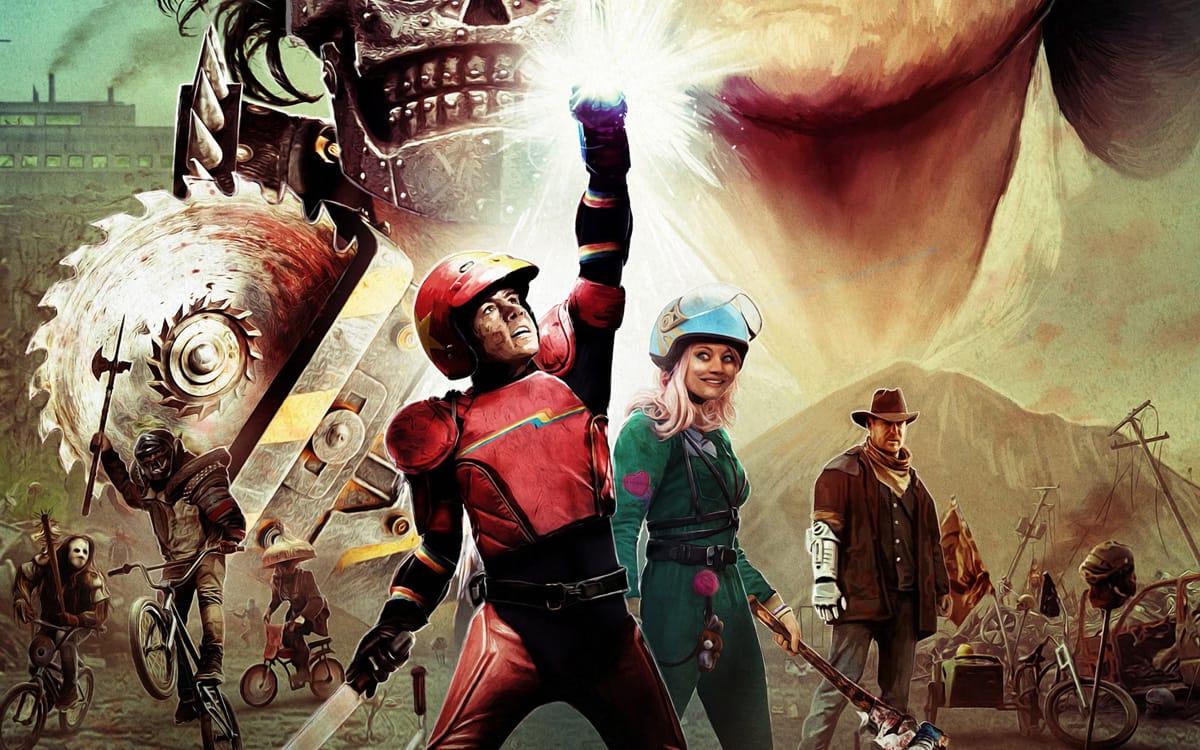Turbo Kid by François Simard, Anouk Whissell, Yoann-Karl Whissell (Review)

When describing Beyond the Black Rainbow, director Panos Cosmatos said it was a love letter of sorts to the sci-fi and horror VHS covers that he saw in video stores as a kid. He never actually watched the movies in question, but the often lurid and fantastical covers fired up his imagination, and served as an inspiration for Beyond the Black Rainbow’s stunning visuals.
This sort of cinematic nostalgia lurks behind a relatively recent crop of indie and low budget genre films, including Beyond the Black Rainbow, Kung Fury, and The FP. It’s easy to write these films off as homages and pastiches — especially something as over the top as Kung Fury — but at their best, these films are more than just genre exercises. It’s clear their creators are very much fans of the films and styles that they reference with abandon.
Turbo Kid is the latest such film to take that approach, and it’s arguably the funnest and most enjoyable of the lot. Yes, it’s true: this is the ultra-gory post-apocalyptic BMX action film with a heart of a gold that you’ve been waiting for.
It’s the year 1997, and the titular kid (Munro Chambers) spends his days riding his beloved BMX bike around the barren wastelands, looking for the scraps of a long-gone civilization to trade for supplies. His only joy in life — besides doing sweet tricks on his bike (to an awesomely retro soundtrack, natch) — is reading issues of Turbo Rider, a comic book about a robot-battling warrior. This threadbare existence is shaken up by two events: the arrival of Apple (Laurence Leboeuf), a pink-haired, “manic pixie dream girl” who looks like she stepped out of an episode of Jem and the Holograms, and his discovery of an honest-to-goodness Turbo Rider outfit, complete with what looks like a death-ray-shooting Nintendo Power Glove.
If the Mad Max movies taught us anything about post-apocalyptic wastelands, it’s that they’re filled with merciless gangs, and Turbo Kid is no different. (Though, in this case, the gangs also ride BMX bikes. Sensing a theme?) Their leader is Zeus (Michael Ironside), who has a past with Turbo Kid and wants to acquire his newfound powers. Can Turbo Kid, along with Apple (who may be more than just a “dream girl”) and a stoic duster-wearing brawler (Aaron Jeffery), survive against Zeus and his gang?
Make no mistake about it, Turbo Kid is a lot of fun. Part of that is due to the cheesy, low-budget aesthetic, and part of that is due to the over-the-top action and gore. Yes, intestines are pulled out through belly buttons, jaws are ripped off, and bodies explode from Turbo Kid’s death-ray — but it’s all in good, Sam Raimi-esque fun à la Evil Dead 2 and Army of Darkness. But more important is the film’s complete lack of guile and cynicism.
Turbo Kid may be the most positive, upbeat film I’ve seen in a long time. (And it’s probably the most positive, upbeat film featuring exploding bodies and buzzsaw-wielding thugs I’ve ever seen.) There’s nary an instance of cynicism to be found in its scenes, and for all of its references and homages, there’s no winking at the camera or any “meta” deconstruction. Turbo Kid plays everything straight, beginning with the Kid’s earnestness and squeaky clean, “aw shucks” demeanor, moving on through the Kid and Apple’s burgeoning ultra-cute relationship, and beyond.
Some may find this approach annoying, especially when it comes to Apple, who does grate a bit in her early scenes (though the film does a decent job of explaining her behavior). But for me, it just made the film that much more charming. Turbo Kid strikes me as the sort of film that was a labor of love for all involved, a film that likely started out as a joke but became much more than the sum of its parts.